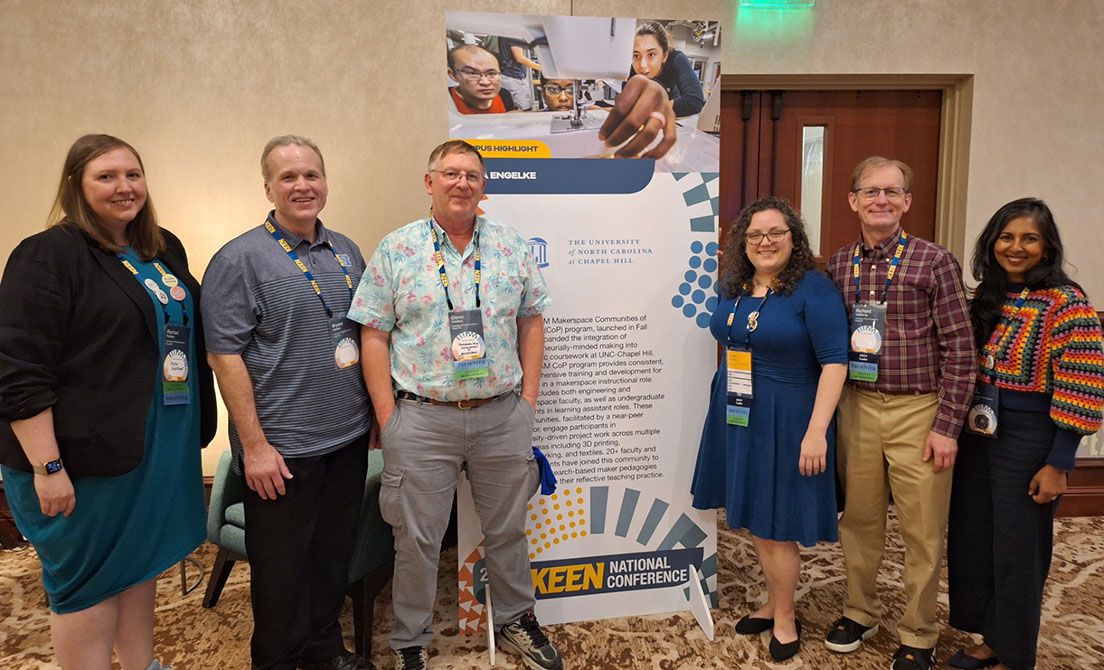APS Educators Share Their Methods at Conference Promoting Innovative Thinking
Professor Richard Goldberg’s students know that at any time during class, they may be challenged with a “micromoment”—a two- to five-minute assignment that promotes innovative, or entrepreneurial, thinking.
In his Department of Applied Physical Sciences course, Developing Your Sixth Sense: Designing Sensors and Electrical Circuits to Make Measurements (APPL240), Goldberg recently presented his students with a scenario involving three types of temperature sensors—a typical oral thermometer, an infrared thermometer used on the skin and an oven thermometer.
Each thermometer, he told them, had unique advantages: oral thermometers are accurate but slow in producing a result; oven thermometers are better at measuring extreme hot and cold temperatures; and infrared thermometers can measure temperature from a distance but are less accurate. The assignment was to brainstorm ideas for other applications for these sensors and to figure out when to use one over another.
Goldberg, an APS teaching associate professor, said developing creative pedagogical approaches is part of a broad effort at UNC-Chapel Hill to instill in students an “entrepreneurial mindset,” which is defined as a set of attitudes, dispositions, habits and behaviors that shape a unique approach to problem-solving, innovation and value creation.
“Entrepreneurial mindset is about the three c’s: curiosity, making connections and creating value,” said Goldberg. “The idea is to promote students’ curiosity and to get them thinking critically.”
Goldberg said students were so enthusiastic about entrepreneurial mindset activities that he decided to share his approach with other academics in the workshop, “EM Micromoment Activities: Transformative Teaching and Learning Experiences,” at the 2024 KEEN National Conference. KEEN, or Kern Entrepreneurial Engineering Network, is a partnership of 55 colleges and universities across the United States, including UNC, whose mission is to instill engineering students with an entrepreneurial mindset.
At the conference, Goldberg was joined by several UNC colleagues who also led workshops: Anna Engelke, BeAM education program manager; Glenn Walters, professor of the practice at APS; Rachel Penton and Viji Sathy from the UNC Department of Psychology and Neuroscience; and Bryant Hutson from the Office of Institutional Research and Assessment.
“These colleagues have been instrumental in our effort to integrate the entrepreneurial mindset into broader UNC coursework and to assess the overall impact,” said Goldberg.
In a workshop on formative versus summative assessment, Engelke and Penton, a teaching associate professor, discussed the formative assessment of entrepreneurial-minded learning in design, making and makerspaces. Formative assessment is used in education to evaluate student learning during the instructional process. Unlike summative assessment, which typically occurs at the end of a semester to evaluate student achievement, formative assessment is ongoing and integrated into teaching and learning activities. Its primary purpose is to provide continuous feedback to students and teachers, informing instruction and facilitating improvement.
“In a design and making process where you’re going through these different steps—identify, connect, design, test, reflect—formative assessment is the way that you step back and figure out whether you need to go back to a different step or whether you need to get more information in the step that you’re in,” said Engelke.
Formative assessment encompasses quizzes, polls, discussions, observations, concept maps and peer assessments, and encourages active student participation and engagement in the learning process.
“The way formative assessment ties in with entrepreneurial mindset is how you’re making the design and making process valuable for the students and the professor,” said Engelke, “and ensuring that their process is connecting with the academic discipline they’re in. The design and making process is not necessarily the core goal; it’s a tool that supports the other learning goals to make them as valuable as possible.”
In the workshop, “Promoting Professional Skills Development in Makerspaces,” Walters explored the ways in which the academic makerspace enhances and expands on curricular content to help develop an entrepreneurial mindset in students and to give them an environment for building their individual and team problem-solving skills.
He discussed the development of a system of metrics that will allow educators, funding agencies and policy makers to quantitatively assess the positive effects that makerspace engagement has on the development of job skills, and guided his colleagues through ways they can recognize soft skills, such as perseverance, teamwork and collaboration, cultivated in the makerspaces.
“There’s a joy or excitement of creation students experience that provides them the intrinsic motivation to continue iterating,” said Walters. “When faculty see those creative skills being developed, they can help their students create a statement about iteratively designing and fabricating a solution, persevering through a design correction in the face of failure, and pushing through toward a successful outcome that meets the needs of stakeholders.”

At a recent KEEN conference, UNC representatives led workshops on their unique approach to teaching. Left to right, Rachel Penton, Department of Psychology and Neuroscience; Bryant Hutson, Office of Institutional Research and Assessment; Glenn Walters, Anna Engelke and Richard Goldberg, Department of Applied Physical Sciences; and Viji Sathy, Department of Psychology and Neuroscience.

